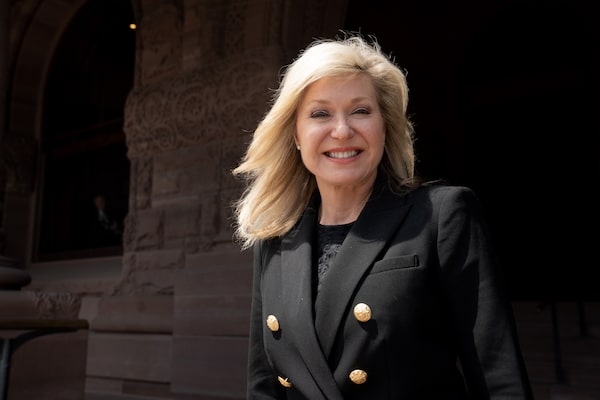
Mississauga mayor and Ontario Liberal Party leadership hopeful Bonnie Crombie walks on the steps of the Ontario Legislature, in Toronto on May 18.Chris Young/The Canadian Press
Mississauga Mayor Bonnie Crombie says she will use strong-mayor powers to override a city council vote that opposed more density and jeopardized an estimated $120-million in federal housing funds.
Ms. Crombie is officially on leave as mayor but took a break from campaigning for the Ontario Liberal Party leadership on Friday to wade back into Mississauga politics. A day earlier, federal Housing Minister Sean Fraser had warned that after the recent council vote in Mississauga, he could not approve the city’s application for funding.
At issue is the extent to which Mississauga allows four-unit residential buildings in all neighbourhoods throughout the city, which Mr. Fraser made a specific condition of access to the federal Housing Accelerator Fund.
This requirement runs counter to decades of zoning policy in North America, where much of city land has traditionally been reserved for single-family homes. Ottawa’s insistence on ending what’s known as exclusionary zoning has sparked pushback in some cities, while others have moved willingly to loosen zoning rules.
Earlier this month Mississauga council was deadlocked on whether to approve in principle such fourplexes. The initiative failed on a 5-5 tie, with Ms. Crombie not present to cast a deciding vote.
All eyes on Bonnie Crombie as Ontario Liberal leadership debates kick off
On Friday, Ms. Crombie announced that she was issuing a mayoral directive on fourplexes. According to her office, she retains the right to do so as head of council, even while on leave.
In her directive, Ms. Crombie said that when she returns to council next month to shepherd the city’s annual budget process she will introduce amendments allowing fourplexes to the city’s official plan and zoning by-law. Under the strong-mayor powers, these could pass with only one-third support of council. In the meantime, she directed city staff to begin work on these amendments.
Ms. Crombie, who was not available for comment, said in a statement that “this is about increasing the supply of housing and providing greater opportunity for those who want to live in our city.”
In response, Mr. Fraser said in a post on the social media site X that it was “great to see that Mississauga will be moving forward on four units as-of-right, along with our other recommendations. I will be very excited to share news with the city next time I’m in town!”
Kelly Singh, a spokesperson for the housing advocacy group More Homes Mississauga, praised the mayor’s intervention.
“While there might be political blowback … it kind of cuts through all the noise,” she said in an interview. “It’s very exciting that things are finally moving forward.”
The federal Liberals have promised $4-billion through 2027 using their Housing Accelerator Fund, money that municipalities can use to reduce fees, improve affordable housing or speed up development approvals. The government has warned that cities that do not meet its criteria, including allowing a bit more density in all neighbourhoods, may not receive the funding.
Late Thursday, Mr. Fraser issued a public letter to the acting mayor of Mississauga, decrying the fourplex vote and, without being specific, some of the arguments made during the debate.
“In the absence of a definitive path forward on ending exclusionary zoning, I am not in a position to approve Mississauga’s application,” he wrote.